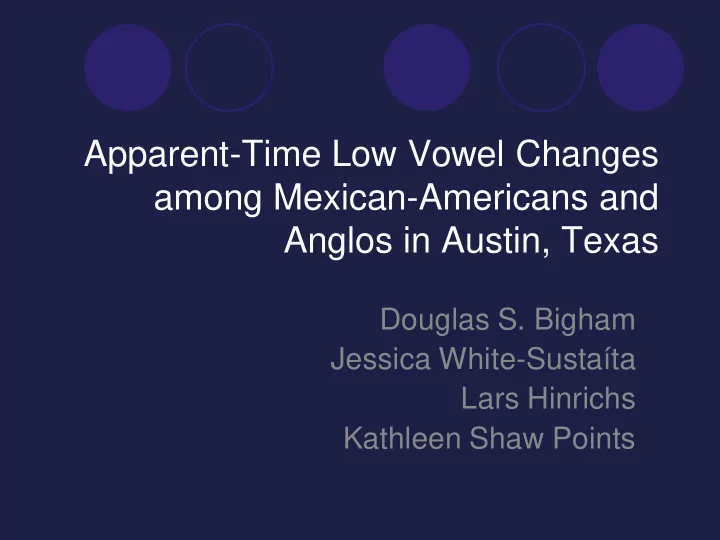

Apparent-Time Low Vowel Changes among Mexican-Americans and Anglos in Austin, Texas Douglas S. Bigham Jessica White-Sustaíta Lars Hinrichs Kathleen Shaw Points
Texas English Associated with South Midland and Southern speech (Bailey & Tillery 2006; Bailey et al 1991; ANAE) Dallas area distinct - “Texas South” (ANAE) Based primarily on Anglo speech Assumed to be Anglo-led (Bailey et al., 1991)
Ongoing Texas English Research Houston (Niedzielski’s HUES) San Antonio (Bayley, Santa Ana) Rural Central Texas (“Springville”, Bailey & Cukor-Avila)
The Texas English Project: Austin Austin Texas Medium-sized urban center (<1million) In the 1990s, Austin’s population grew by 48% and between 2000 and 2006 it was rated as the 3rd most rapidly growing city in America. 65% white, 10% African-American, 30% Latino (53% white, non-hispanic)
Project Goals Sound Change: Ethnolects in contact Importance of minorities’ roles in majority sound changes (Fought, 2002) Who leads change in ethnically-diverse contact milieux?
Minority & Majority Dialects in Contact Assumed that minority speakers pressured to assimilate to majority norms. Influence is bidirectional. Majority speakers may adopt minority features for covert prestige (Preston, 1999)
Research Questions 1. How are low vowels realized by Anglo and Latino residents of Austin? 2. Are those realizations different across ethnicity? 3. Are those realizations different across age?
Low Vowel Paradigm PRICE, LOT, THOUGHT, TRAP (Wells, 1982) PRICE: status of monophthongization LOT~THOUGHT: merged or distinct TRAP: raised, backed, stationary
PRICE Monophthongization: key feature of Southern speech (ANAE) Blocks TRAP retraction and LOT fronting (Bigham 2008) Texas English: monophthongal PRICE among Anglos diphthongal PRICE among Latinos (Tillery et al 2004; Thomas 2001)
LOT~THOUGHT Merger: key feature of “Third Dialect” (Labov 1996) Promotes TRAP retraction (Gordon 2004; Bigham 2008) Texas English: merger incomplete among Anglos (ANAE) merger complete among young, urban Anglos (Bailey et al 1991) merger: Latinos to LOT; Anglos to THOUGHT (Thomas 2001)
TRAP Movement up left periphery first stage of NCS (ANAE) Retraction in Canadian shift (Clarke et al. 1995; Roeder & Jarmasz 2008) and other “Third Dialects” (Eckert 2004; Bigham 2008) Texas English (Thomas 2001): Latinos- front and low, even pre-nasally Anglos- raises pre-nasally
Methodology 14 female participants Full adults (older) & emerging adults (younger) (Arnett 2002) Anglo & Latino Evenly distributed across categories Span of classes and educational levels Austinites Data Word list recitations, bVt & hVd tokens, six repetitions each F1 and F2 measurements at five points Cartesian Distance
PRICE non-monophthongization
LOT~THOUGHT merger Age: p =.30 Ethnicity: p =.16 Interaction: p =.23
TRAP fronting (!) Age: p =.<.0001 Ethnicity: p =.006 Interaction: p =.21
Conclusion: *Austin* Texas English PRICE completely diphthongal No difference between Anglo & Latino speakers LOT~THOUGHT no distinction in Latino & Anglo placement distinct in production but becoming closer majority-led change TRAP fronting (!) minority-led change
What’s Next for the Texas English Project? Adding a third, extra-older, generation Adding males to the data Adding African-American speakers Analyzing additional stylistic contexts for data
The End Thanks to: University of Texas at Austin Liberal Arts Instructional Technology Services Division of Instructional Innovation & Assessment Department of English Texas English Project: www.texasenglish.org Lars Hinrichs: lars@mail.utexas.edu Douglas Bigham: douglas.s.bigham@gmail.com Jessica White-Sustaíta: jessicawhite@mail.utexas.edu
Recommend
More recommend